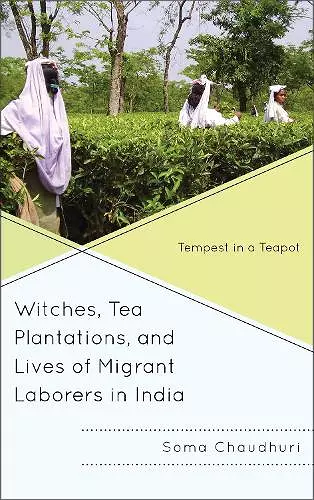Witches, Tea Plantations, and Lives of Migrant Laborers in India
Tempest in a Teapot
Format:Paperback
Publisher:Bloomsbury Publishing PLC
Published:3rd Jun '16
Currently unavailable, and unfortunately no date known when it will be back
This paperback is available in another edition too:
- Hardback£88.00(9780739149942)

Witches, Tea Plantations, and Lives of Migrant Laborers in India: Tempest in Teapot is a unique book that brings together a holistic theoretical approach on the subject of witchcraft accusations, specifically those taking place inside a tea workers' community in India. Using a combination of in-depth and extensive qualitative methods, and drawing on sociological, anthropological, and historical perspectives, Chaudhuri explores how adivasi (tribal) migrant workers use witchcraft accusations to deal with worker-management conflict. Chaudhuri argues that witchcraft accusations can be interpreted as a periodic reaction of the adivasi worker community against their oppression by the plantation management. The typical avenues of social protest are often unavailable to marginalized workers due to lack of organizational and political representation and resources. As a result, the dain (witch) becomes a scapegoat for the malice of the plantation economy. Within this discourse, witch hunts can be seen not as exotic and primitive rituals of a backward community, but rather as a powerful protest by a community against its oppressors. The book attempts to understand the complex network of relationships—ties of friendship, family, politics, and gender—that provide the necessary legitimacy for the witch hunt to take place. In most cases examined here, seemingly petty conflicts within the villagers often escalate to a hunt. At the height of the conflict, the exploitative relationship between the plantation management and the adivasi migrant workers often gets hidden. The book demonstrates how witchcraft accusations should be interpreted within this backdrop of labor-planters relationship, characterized by rigidity of power, patronage, and social distance. Witches, Tea Plantations, and Lives of Migrant Laborers in India should appeal to criminologists, sociologists, anthropologists, labor historians, gender scholars, labor migration scholars, witch hunt and witchcraft accusation global scholars, adivasi scholars, South Asian scholars, and anyone interested in India’s tribes, witchcraft accusations, gender in a global world, labor conflict, and Indian tea plantations.
I think that this excellent book. . . .is a very useful contribution in the increasing sociological and anthropological research on Indian plantations. * Contributions to Indian Sociology *
Soma Chaudhuri uses the thoroughly impressive privileged knowledge she gained in her study of adivasi migrant workers to describe and analyze witchcraft accusations among them. Utilizing a highly persuasive line of reasoning, Chaudhuri invites us to a splendid tour-de-force description of the phenomenon, culminating in a scholarly serious and intrinsically captivating sociological interpretation. To really understand witchcraft accusations we need to realize that they do not simply reflect violence against women, but have to be understood within the specific cultural context of politics within the plantations where the accusations take place, and where victims are caught in a web of conspiracies constructed by their fellow men and the plantation owners and managers. Chaudhuri’s book is an eye opener and a must read for anyone interested in this topic. -- Nachman Ben-yehuda, Hebrew University
ISBN: 9780739185247
Dimensions: 227mm x 152mm x 17mm
Weight: 327g
190 pages